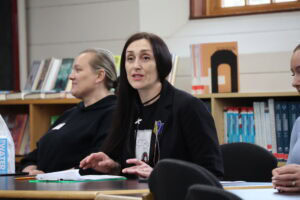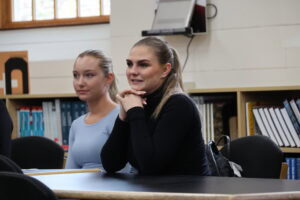April 14, 2025
Beyond Borders: A Ukrainian Teacher, a Russian Businesswoman, & the Humanity in War
Alexandra Lenarchyk ’26 organized a thought-provoking discussion between a recent Ukrainian refugee and a Russian-born U.S. business owner regarding the war between Ukraine and Russia. Lenarchyk told those in the audience that this discussion was from a humanistic viewpoint, not a political one. Thousands of miles away, the war raged with a Russian attack on Palm Sunday that killed 34 people. Irina from Ukraine and Ina from Russia didn’t come to debate or defend. They came to tell their stories. This was not about governments or ideologies. This was about loss, resilience, guilt, hope, and above all, humanity.
“I am not a victim. I am a voice.” These words, spoken by Iryna, a Ukrainian teacher who fled her homeland with only a suitcase and a heart full of memories, capture the essence of a powerful and deeply human story.
Iryna shared her story by reading from a paper. She explained that her English wasn’t strong since she only arrived as a refugee in the U.S. a year ago. As a former teacher from a small town in Ukraine, Iryna once knew every student by name and every lesson bell by heart. Her life was simple, rich with connection and purpose. Then came February 2022—the night her world shifted forever. She was jolted awake by the sound of military planes flying overhead. The war had begun.
“I held books in my hands one day,” she said, “and the next, a suitcase.” She left her mother, her home, her classroom, and everything she had built. In exchange, she arrived as a refugee, uncertain and adrift in a new country.
Still, she chose to begin again. “I am not Iryna,” she explained with a smile. “Now I am Irena.” She started a new life with a new name—learning English, working in a Ukrainian school in Hartford on weekends, and rediscovering her sense of identity. “I can learn a new language,” she said. “And I am looking for myself, new self, strong, free, alive.” But every night, she remembers the empty desks of her old classroom and the echoes of students’ voices lost to the war.
After Iryna shared her experience, Ina, from Russia, wiped away tears. She faced a different but equally painful awakening. “I went to sleep normal,” she said, “and woke up the villain.” A mother, business owner, and educator, Ina runs a nail salon and teaches vocational classes at a community college in Connecticut.
The day the war began, she walked into her salon—her sanctuary—only to be met by silence and sobs. Her coworkers, many Polish and Ukrainian, were frantically trying to arrange shelter for their families back home. Ina felt out of place, helpless. “What could I do as a Russian citizen, even if I didn’t support this war?”
So, she found a way. She turned her classroom into a space of empowerment. Many Ukrainian women arriving in the U.S.—doctors, professors, teachers—had to start over from scratch. Through her 100-hour nail technician course, Ina helped them gain their first American professional licenses. She also welcomed them into her salon to practice, find work, and, most importantly, regain dignity.
“Sometimes we read the same news from completely different parts of the world,” she noted. “It’s the same event, but we’re told two different stories.” Yet, despite these fractured narratives, they shared something profound: a desire for peace, for understanding, for a better way forward.
“People immediately divided the world into two bags—the good and the bad,” Lenarchyk said. “But the truth is much more complex.”
Lenarchyk said that he war in Ukraine is often framed in black and white, where people label entire populations without making any distinctions between the government’s actions and the individuals living in these countries. “These are real people, each with their own stories, caught in a situation they had little control over,” she said. But wars are lived in shades of grey. Ukrainians like Iryna mourn lost homes, fractured families, and stolen futures. Russians like Ina face moral conflict, judgment, and inherited guilt for a war they never chose.
History between Russia and Ukraine is long and tangled, full of shared roots and painful separations. But while the politics are complicated, the pain is universal. And as the conversation continued, students, teachers, and community members with backgrounds from Eastern Europe added their voices—Poles, Moldovans, Americans—each offering stories of their own. Lenarchrk said that meeting people with different backgrounds helped her understand the complexity of the situation.
Upper School teacher Micah Duhaime, who is teaching a course on propaganda next year, said that social media tends to simplify complicated scenarios so that nuance and context are missing. “It’s human instinct to try and understand everything around us in more simple terms,” he said. “We need to disentangle these false binaries, these oversimplifications. We need to embrace complexity.”
One student, Dorian Ciscel ’26, who is of Moldavian descent, saw the impact of the war firsthand while visiting his relatives in the Moldavian capital, Chisinau, in 2023. He said he had never seen the capital as crowded and chaotic due to the flood of refugees escaping the war. “It continues to be this large issue with how all these refugees can be supported, “ he said, “and ensure they are given the opportunities and supplies they need.”
As the event drew to a close, Iryna left the audience with a final plea: “Please remember, somewhere in my country, the school bells are still silent.”
The world may debate policy and strategy, but stories like Iryna’s and Ina’s remind us that the heart of any conflict is the human experience. Their courage to speak—to sit beside each other in vulnerability and truth—offers a rare glimpse of what real peacebuilding looks like. It starts not with agreements between nations but with conversations between neighbors.
